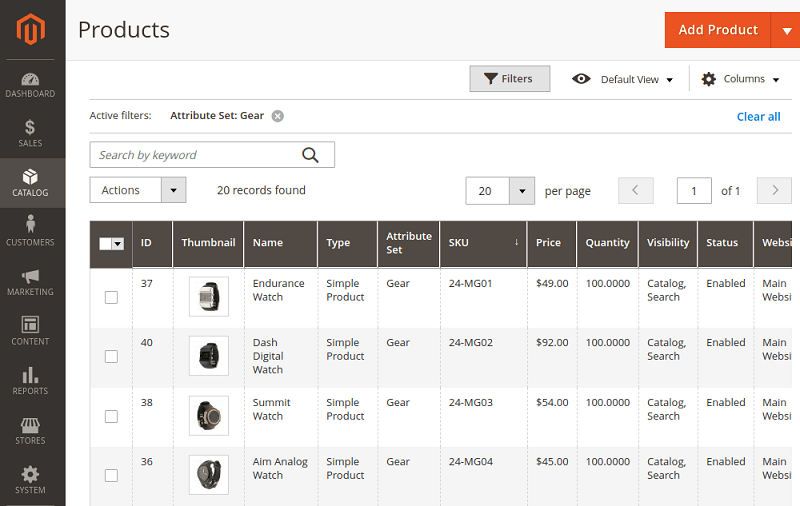The online world started out pretty inaccessible, unless you were a coding expert well versed in web development. Now though, it’s possible for individuals, small businesses and organisations alike to create stunning digital spaces, regardless of budget and technical experience.
When it comes to buying and selling over the internet, dedicated ecommerce platforms have revolutionised the process. Merchants have a huge number of these tools at their disposal, so it can be difficult to find the best online store management system for your specific business needs.
Magento repeatedly ranks as one of the top ecommerce platforms, but why is it so popular and why exactly can it do for your business?
What is Magento?
When wanting to build a website, those without the technical knowledge rely on a content management system (CMS), the most popular of which is WordPress. Through an interface, users are able to structure, design and publish content. It’s not uncommon for a CMS to offer e-commerce plug-in compatibility as a premium feature.
Whilst WordPress is multi-purpose, Magento is a CMS specifically tailored to ecommerce. Released in 2008, it’s an open source platform for creating an online store, complete with shopping cart system, catalogue tools, themes and search engine optimisation.
Magento only requires basic web development skills, making it a user-friendly web application.
What are the Features of Magento?
As Magento serves many enterprise merchants, they have developed an immense amount of built-in features, which encompass the entire shopping experience. Here are the features you’ll surely take advantage of first when using the platform:
- Site Structure: centralised admin panel, customisable templates, captcha functionality, multiple languages/currencies
- Catalogue: navigation, filtered results, attributes, customer sorting, inventory management, pricing rules, category landing pages
- Product: stock availability, related products, add to wish list, multiple images, image zoom capability, comments and reviews
- Pricing: multi-tier pricing, promotional coupons, bundles, pricing rules
- SEO: Google site map, optimised URLs, meta information for products and categories, popular terms page, URL rewrite support
- Account: shopping cart, wish list, transaction history, suggested items, newsletter
There are many other features, including those that cover customer service, external payment support, security and analytics. Check out the full Magento Feature List to learn more.
The Benefits of using Magento
Magento offers scalable ecommerce for accommodating your business at any stage. As an open source technology, users take advantage of brilliant flexibility and support. It’s a fantastic choice for long-term development, and here’s why.
- SEO friendly
It’s obvious that Magento is an SEO-friendly CMS, based on the various SEO features they offer and the manner in which they help you build your shop. After all, you could have the most tempting items in stock, but unless people can find it, you can’t make a sale.
The ecommerce platform automatically generates a sitemap, effectively your website’s blueprint, which allows search engines to make sense of your site. Magento will also create convenient URL structures that outperform vague examples. It’s easy to create meta tags and descriptions for each product, and you benefit from excellent keyword suggestions.
Magento also has comprehensive analytics so that you can track your visitors and streamline site visibility and performance.
- Customisation
When you’re unable to code a website yourself, you’re at the mercy of the developers who create the CMS. Thankfully, Magento offers a huge amount of customisation, meaning you still have create input and authority over your online store. It’s open source so there’s minimal restrictions to the mods you can make.
Magento web development is compatible with thousands of extensions and plug-ins, including those to do with marketing, subscription services, payment gateways, logistics, accounting and analytics. In this sense, your store is modular thus easily adapted to changing business needs.
Extensive custom functionality, requiring the creation of your own code, requires some programming knowhow, including familiarity with the PHP scripting language that Magento is written in. If you are looking for Magento support in Sydney, professional web development allows you to develop the store that caters perfectly to you.
- Superior Speeds
A standard CMS isn’t specifically designed for ecommerce, so you’ll have to install a third-party ecommerce plug-in. The beauty of Magento is that it’s an all-in-one system, so compatibility is no issue and loading times are much shorter.
Nobody is happy navigating a slow site. If you aren’t ensuring speed, many of your visitors will give up in favour of a more convenient storefront. Using progressive web application (PWA), Magento is made even faster on both mobile and desktop devices, so you don’t have to worry about losing business from poor optimisation.
Final Thought
Magento is an extremely versatile ecommerce platform, arguably the best option for larger companies. Even at the most basic level, local businesses can quickly expand by investing in superior store technology that optimises customer experience.
The best online stores are those that feel intuitive, look great and run fast, all of which are made possible through the Magento ecommerce platform.

